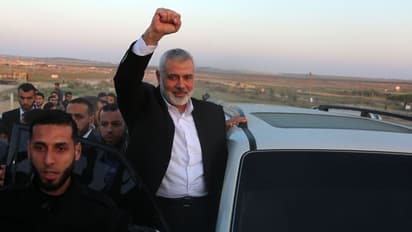Hamas chief killing: India warns nationals to avoid non-essential travel to Lebanon amid escalating tensions

Synopsis
This advisory comes after similar warnings from other countries, including Australia, the United States, and Britain. Australia's Foreign Minister Penny Wong has urged Australian citizens in Lebanon to leave the West Asian nation immediately.
The Indian Embassy in Beirut on Thursday (August 1) issued an advisory urging Indian nationals to avoid non-essential travel to Lebanon due to the escalating tensions in the region. The advisory also instructed Indian residents in Lebanon to restrict their movements and maintain regular contact with the Embassy through designated email or emergency phone number.
In a tweet, the Embassy said, "In view of the recent escalations in the region, Indian nationals are advised to avoid all non-essential travel to Lebanon."
Wayanad landslide: Rescue ops continue at Mundakkai and Chooralmala; death toll crosses 270
"All Indian nationals in Lebanon are advised to exercise caution, restrict their movements and remain in contact with Embassy of India in Beirut through their email id: cons.beirut@mea.gov.in or the emergency phone number +96176860128," it further said.
This advisory comes after similar warnings from other countries, including Australia, the United States, and Britain. Australia's Foreign Minister Penny Wong has urged Australian citizens in Lebanon to leave the West Asian nation immediately. "Now is the time to leave, the security situation could deteriorate quickly with little or no notice," Wong said in a video message on social media platform X.
She pointed to the risk of Beirut airport shutting down, potentially stranding people for an extended period, and advised Australians to use commercial flights while they are still operational.
The Middle East has been on edge for months due to Israel's war in Gaza, which has resulted in tens of thousands of deaths and a severe humanitarian crisis. The situation further deteriorated following the assassination of Hamas leader Ismail Haniyeh in Tehran, for which Iran has blamed Israel. Historically, Iran has balanced its actions to avoid an all-out war while pressuring Israel through its allies and proxy forces. However, with Haniyeh's assassination, Iran's response remains uncertain.
Iran's supreme leader, Ayatollah Ali Khamenei, has ordered a direct strike on Israel in retaliation. Military commanders are considering a combination attack involving drones and missiles targeting military sites near Tel Aviv and Haifa, while avoiding civilian areas to prevent further escalation.
Stay updated with the Breaking News Today and Latest News from across India and around the world. Get real-time updates, in-depth analysis, and comprehensive coverage of India News, World News, Indian Defence News, Kerala News, and Karnataka News. From politics to current affairs, follow every major story as it unfolds. Get real-time updates from IMD on major cities weather forecasts, including Rain alerts, Cyclone warnings, and temperature trends. Download the Asianet News Official App from the Android Play Store and iPhone App Store for accurate and timely news updates anytime, anywhere.